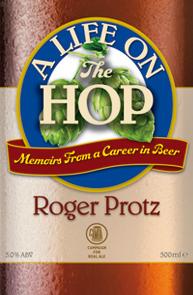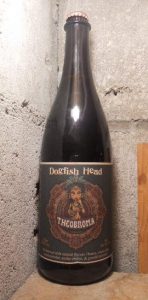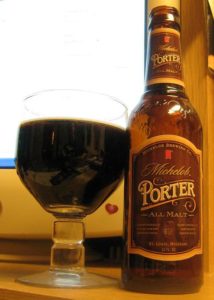 I bought a copy of this book after looking around and only finding Knut’s observations from last summer on the difference between its marketing and that of Pete Brown’s Hops and Glory. There was a press release by its publisher CAMRA, a nibbly bit by the NUJ, a smidge from his editorial assistant but I couldn’t seem to come up with a review other than the one that Knut found in The Westmorland Gazette:
I bought a copy of this book after looking around and only finding Knut’s observations from last summer on the difference between its marketing and that of Pete Brown’s Hops and Glory. There was a press release by its publisher CAMRA, a nibbly bit by the NUJ, a smidge from his editorial assistant but I couldn’t seem to come up with a review other than the one that Knut found in The Westmorland Gazette:
A Life on the Hop is an amusing romp around the beer world and is devoid of beery jargon. It will be enjoyed not only by beer lovers but also by those who enjoy travel writing.
Magic. I’ll miss print journalism when it dies.
There has been much sport made of Mr. Protz but it is not something that I really understood as he is not a often discussed writer in this part of the world. So, being the good boy that I am, I thought I would have a read of his autobiography to learn a bit more to either join in the slag-fest or, more fairly, get a bit of perspective. I was in for a little shock.
The book is subtitled “Memoirs of a Career in Beer” and the key word is “memoirs” – as this really isn’t an autobiography but a series of anecdotes arranged in themes based largely but not solely on geography. I learned this in the first chapter when I thought I would learn about his childhood but where I learned about pubs he liked in around his first London newspaper work in Fleet Street – the Cheese, Punch, Old Bell, Old King Lub, Black Friar and the Globe. I didn’t know what to make of it – not much Roger, lots of tavern. Then you are quickly into chapters take you through the Czech Republic, Scotland, Ireland, Belgium Germany, Mexico and the USA as if someone were gleaning through one’s old note books in search of favorite and perhaps not too often repeated yarns of a wag. About a hundred pages in, I started turning down page corners after I read errors vaguely Canuckois like:
a. Fraunce’s Tavern in New York dates from 1790 “when New York was still under British rule” [p.107] The British left in 1783 (some moving to help found my town) and the building dates from 1719.
b. the Yakima Valley of Oregon was once part of “French Canada” [p.124] even though the French speaking part of Canada was far to the east and I think that the Yakima was south of the part of the area of the British claim.
I folded down more corners until I stopped around page 167. I didn’t really care that I doubted his explanation of the genesis of the term steam beer [p. 117] or that lambic is the oldest beer style known to mankind, being close to beer dating back to Egypt, Babylon and Mesopotamia [p. 129]. Did it really matter that Babylon was a city state within Mesopotamia? Was I missing the point?
I didn’t miss that there is something of a cranky, indiscreet tone to these travels. Targets include Tories who put him up for the night, corporations and two older ladies encountered in Prague having a private conversation:
I was crossing the square with Graham Lees, a CAMRA founding member with an acerbic turn of phrase, when we passed two elderly American women who were eyeing the fabulous architecture of the area. “Y’know,” one of them said to her friend, “it’s nothing like Poughkeepsie.” Lees went red in the face, chased after them and snarled: “Of course it’s nothing like fucking Poughkeepsie. It’s been here for several fucking centuries.” It was his finest hour.
That’s the finest hour for an arsehole, perhaps. It’s that kind of small coarse tone that you hear in a far too graphic and entirely gratuitous of an account of the suicide of a brewer in an early chapter and the tragic affect on the family or, later, the naming of names of fellow beer tourists who may have broken marital vows at Oktoberfest. You may come away wondering what sort of person would make that part of a book.
Yet he is obsessed with beer. And has spent a life following it – a life that I realize the more I write about beer sometimes can mean hard scrabble and closed doors. It’s a little bittersweet when despite all the years he is not able to arrange for proper accommodations on an invite to the US and back on a liner. It’s a little poignant when he thinks that when someone isn’t able to meet with him because Roger is going to reveal the truth about a merger when it is likely the guy was just too busy. It is a tough old road and a long one. It’s likely one that he takes pride in taking – a road not often taken when he started out. That pride and hard effort comes out as well.
One beer writer chastised me for an unkind comment by email a few months ago, saying: “anybody who started writing about beer since 1995 (just picked that year out of the air – maybe it should be 2000… should pause. If it weren’t for people like Roger they might not be able to be doing what they do.” He also said that he wouldn’t use him as a source but the point is still a good one. When it wasn’t easy, when it didn’t pay well and no one could roll out of bed and blog their thoughts within 17 minutes, Roger was out there writing about beer. He probably got you from one stage of interest to another at some point. And that is what the book is really about. You will get irritated, you will not find out the information you might have thought you would find and you will turn down corners when you find another error – but you will get a sense with the man.
So, buy the book and share your thoughts. Just don’t go on a beer tour with him and give him any reason to think you went off for the evening with the buxom lonely lush. You may read about it later.





